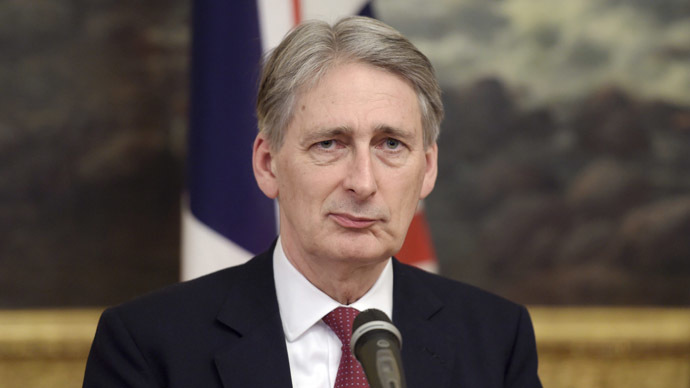British Foreign Secretary Philip Hammond rejected calls for military intervention in Libya, insisting a political solution must be found to the North African state’s struggle against the so-called Islamic State (IS, formerly ISIS/ISIL).
Hammond said on Thursday that efforts to install a national unity government will help Libya in its struggle against terrorist groups.
His comments follow an appeal by Libya to the UN Security Council to lift its arm embargo, so it can counter threats from IS and other militants.
Libya’s internationally recognized government currently controls only half the country. A rival government based in Tripoli claims to be the legitimate one.
Speaking alongside his Algerian counterpart Ramtane Lamamra in Algiers, Hammond said: “We don't believe that military action can solve the problem in Libya.”
“The Algerian position and the British position are identical ... we believe in an inclusive political solution in Libya.
“Efforts to empower Libya to install a national unity government will help its struggle against terrorism and prevent the [IS] terrorist group from gaining a foothold in Libya,” he added.
Speaking in Madrid later that day, Hammond said the UN Security Council would not lift an arms embargo on Libya until the country had a unified government.
In a joint press conference with Spanish Foreign Minister Jose Manuel Garcia-Margallo, Hammond said: “The problem is that there isn't a government in Libya that is effective and in control of its territory. There isn't a Libyan military which the international community can effectively support.”
“Simply pouring weapons into one faction or the other, which is essentially what has been proposed, is not going to bring us to a resolution to the crisis in Libya,” he added.

His comments echo those of US State Department spokeswoman Jen Psaki, who said the United States believes “a political solution, one that is non-intervention, is the right path forward.”
Libya submitted a draft resolution to the UN Security Council calling for the arms embargo, which has been in place since the country’s revolution in 2011, to be lifted.
Libyan Foreign Minister Mohamed Dayri told the council Libya needs weapons in order to deal with “rampant terrorism.”
READ MORE:Libya requests UNSC lift arms embargo to fight ISIS
Bernardino Leon, the country’s envoy to the UN, said he was hopeful a unity government would be formed soon. “The differences between the parties are not insurmountable,” he told the Security Council.
Egypt’s Foreign Minister said he supported lifting the arms embargo following the beheading of 21 Egyptian Coptic Christians by IS militants in Libya.
The Islamic State released a video showing the mass execution of the Egyptian workers who they had kidnapped and held hostage for weeks.
Egypt launched airstrikes against IS targets in Libya on Monday following the video’s publication.
READ MORE:ISIS plans to invade Europe through Libya – report
Egyptian President Abdel Fattah Sisi called for a UN resolution enabling international forces to intervene in Libya.
The North African state descended into factional fighting following the NATO-backed overthrow of Colonel Muammar Gaddafi in 2011.
While two rival governments claim legitimacy, other militia groups have seized areas of the country.
Before the revolution, Libya was one of the wealthiest nations in Africa, with the highest GDP per capita and the highest life expectancy.

